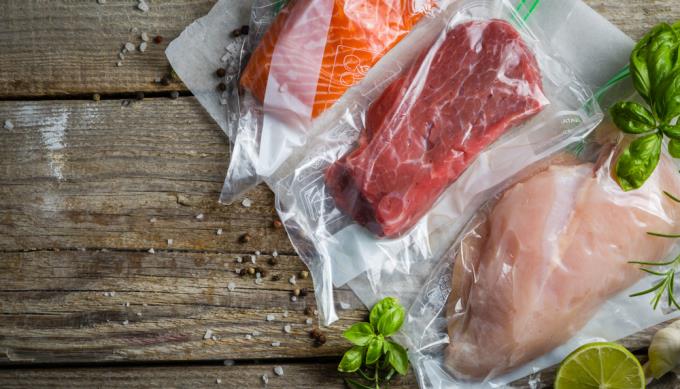Doctors do not encourage pregnant women to eat raw foods, as objective factors such as uncooked foods can harm the health of both mothers and babies even though some dishes look safe. The story that aFamilyToday Health shares below will hopefully contribute to help you raise your vigilance.
Pregnancy is a very enjoyable and rewarding time, but besides that, there are a lot of things you must keep in mind, such as eating. Recently, a seven-month-pregnant Thai woman died after eating undercooked pickled clams bought by her mother from a nearby seafood market. Cockles is a popular Thai dish and can be enjoyed in a variety of ways, from raw to well-cooked.
Everything was normal until the meal ended, the pregnant woman began to show strange symptoms such as abdominal pain and diarrhea so severe that she had to ask for leave of absence. However, a few days later, neighbors did not see her walk out of the house until a child found her pregnant woman lying on the floor and was unable to survive. Police said they did not find any suspicious evidence of death from the murder.
Local media did not reveal the cause of the death, but it is suspected that the pregnant woman passed away from severe diarrhea caused by food poisoning from the previous scallop dish.
For pregnant women, food hygiene is the most important thing

The accident with the ill-fated woman above is a reminder for all pregnant mothers to avoid eating raw foods. Remember, raw foods are not safe no matter how clean and delicious they look, because our naked eyes cannot see bacteria.
Danger when pregnant women eat raw food
It is not unquestionable that pregnant women are advised to limit their intake of raw foods to the maximum extent, as food sources are likely to lack hygiene, which in turn leads to diarrhea or more severe illness. In addition, pregnant women eat raw foods also have certain risks such as:
Raw materials including fish, meat, and vegetables that have just been processed contain many harmful substances that can lead to infection. While some factors only make pregnant women dehydrate and weaken, others have the ability to infect the fetus, thereby causing serious health problems or even death.
One bacteria that pregnant women are susceptible to is Listeria. It is commonly found in soil, dirty water, or plants, but Listeria can migrate to raw fish or vegetables while it is processed (such as smoked or dried). Listeria is also capable of transmitting to the fetus across the placenta, although the mother's health is very normal. Listeria infection in unborn babies can lead to premature birth , miscarriage, stillbirth ...
Raw meat in raw and raw salads also contains a lot of pathogens both on the surface and in the meat, thereby adversely affecting the fetus including problems such as stillbirth or mental retardation.
Raw eggs and scrambled eggs can contain Salmonella, a bacterium associated with vomiting, diarrhea and fever. In rare cases, this bacteria also causes pregnant mothers to experience cramps in the uterus, which can lead to premature birth or stillbirth.
Tips for pregnant mothers

For vegetable and meat dishes
Fruits and vegetables should be thoroughly cleaned to remove soil particles and dirt on the surface, preferring agricultural products from trusted places or growing your own. Pregnant mothers should also add foods rich in vitamin A such as liver in moderation.
Avoid fish of large sizes including shark, swordfish, mackerel and tuna as they can be high in mercury. Choose fish high in omega-3 but limit your intake to about 2 times a week.
Raw foods should be excluded from your diet.These include:
Raw egg food products, such as mayonnaise, cream, boiled eggs, scrambled eggs ... If you go shopping in the supermarket, check the ingredient labels to make sure the manufacturer has sterilized them. Thoroughly all raw materials.
Meats such as poultry, beef, fish and shellfish, including sushi. Make sure all raw meats are fully cooked and clean enough to eat.
Limit items like:
Sprouts sprouts, unless they're fully cooked
Minced meats are found in hamburgers, sausages
Unpasteurized products, such as milk, cheese, eggs or juice
Smoked or dried dishes.
Caffeine and alcoholic beverages
Caffeine can pass into the placenta or pass to the baby if not properly digested and lead to problems later on. Pregnant mothers should limit their caffeine intake to less than 200 mg per day
Doctors also note that pregnant mothers should stay away from alcoholic beverages because of their negative effects.
Diarrhea during pregnancy is dangerous?
Diarrhea during pregnancy can be a danger. If "goes heavy" more than 3 times a day, pregnant mothers should be careful because the body is likely to be dehydrated. See your doctor as soon as possible to avoid unusual complications. Here are some tips of aFamilyToday Health on how to take care of your body if pregnant women have diarrhea:
Drink a lot of water
Try to eat a few light, easy-to-digest foods
Avoid foods like raw milk, greasy dishes, seafood, or foods that are difficult to digest
When having diarrhea, pregnant mothers do not need to take medicine because actually, the body is eliminating toxins or pathogens. Some drugs help stop the diarrhea right away, but this is sometimes not good, since the pathogens are still trapped in the body, making the recovery slow.
Doctors do not encourage pregnant women to eat raw food because dangerous complications can occur at any time, affecting the lives of both mothers and children.













